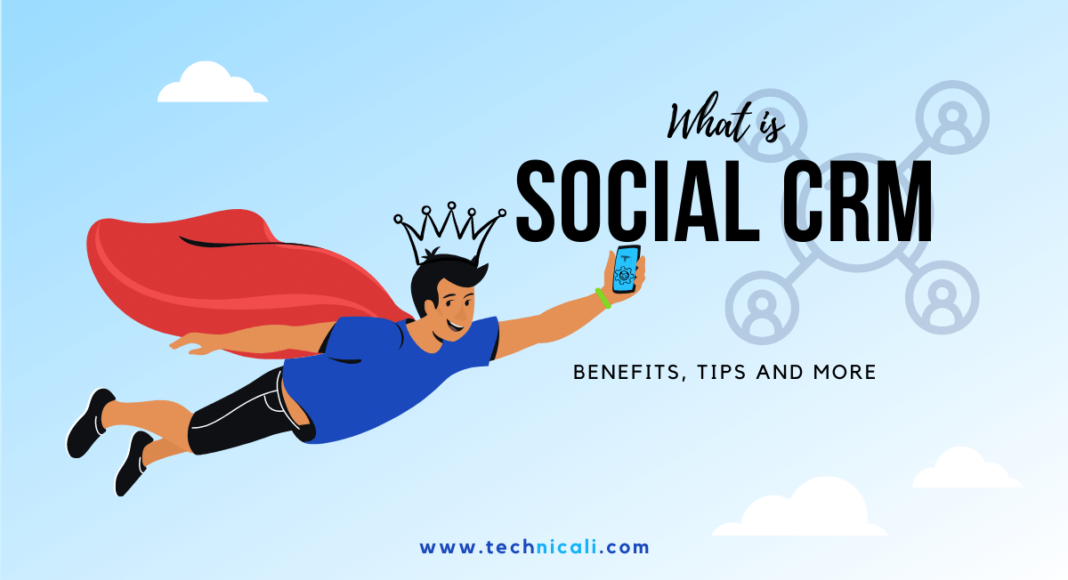As social media becomes an increasingly important communication channel, businesses are looking for ways to integrate social media into their customer relationship management (CRM) platforms. This is where social CRM comes in. According to Gartner estimates, the global CRM market will grow at a 13.5 percent Compound Annual Growth Rate (CAGR) through 2022. With social media and CRM together, companies gain a more powerful overview of what people are posting about on social media and a clearer understanding of brand sentiment. If organizations can use social CRM to respond
Contents
What is Social CRM?
Social CRM uses social media and other online tools to engage with customers and manage customer relationships. It is a way for businesses to connect with their customers and build relationships based on trust and transparency. Social CRM can cultivate leads, create loyalty among customers, and provide customer service. Social CRM is different from traditional CRM. It emphasizes two-way communication and interaction between businesses and their customers. Social CRM tools can include social media monitoring, customer relationship management software, and online customer communities. When used effectively, social CRM can help businesses build better relationships with their customers and improve their overall customer experience.
10 Benefits of Social CRM in Business

Social CRM (Customer Relationship Management) is the process of building relationships with customers and potential customers through social media. It’s a way to connect with people interested in your brand, product, or service.
Here are 10 benefits of using social CRM in business:
- Increase brand awareness and reach new markets: By being active on social media, you can connect with new and potential customers who might not be aware of your brand otherwise. You can also use targeted advertising to reach new markets that are most likely to be interested in your product or service.
- Connect with customers and build relationships: Social media provides an opportunity to connect with your customers on a more personal level. You can respond to their comments and questions and build relationships of trust and transparency. This can help create loyal customers who are more likely to recommend your brand to others.
- Increase customer loyalty: When you connect with customers on social media and provide excellent customer service, they are more likely to be loyal to your brand.
- Collect feedback and insights: By monitoring social media conversations, you can collect valuable feedback and insights about your product or service. This information can help you to improve your products and services and better meet the needs of your customers.
- Understand customer sentiment: Understanding how customers feel is essential to providing good service. And while there are many ways to gauge customer sentiment, social CRM provides a unique and powerful perspective. By monitoring social media channels, businesses can get a real-time view of how customers feel about their products and services. In addition, social CRM can help businesses to identify and resolve problems before they escalate. As a result, social CRM provides a valuable tool for understanding and improving customer sentiment. And that, in turn, can lead to improved customer satisfaction and loyalty.
- Stay up to date with trends: Whether you’re a business owner or an individual consumer, you need to be aware of the latest shifts in your industry to make informed decisions. That’s where social CRM comes in. Social CRM is a tool that allows businesses to track and analyze social media conversations. This data can provide valuable insights into customer behavior and preferences. It can also help businesses identify emerging trends so that they can quickly adapt their strategies. In a rapidly changing world, staying ahead of the curve is a major advantage.
- Segmenting Your Target Audience: Having a solid understanding of your target audience is important. Social CRM allows you to segment your audiences more effectively, making it easier to tailor your marketing and sales efforts to their needs and interests. This, in turn, can lead to more conversions and higher customer lifetime value. Additionally, social CRM can help you better understand your customers’ overall buying journey, allowing you to optimize and update your marketing strategies.
- Resolving Faster: Time is of the essence; time is money. And in the age of social media, that adage has never been more true. With customers now able to reach out to businesses through various channels – Twitter, Facebook, Instagram, Snapchat – the expectation is that companies will respond quickly and efficiently to their inquiries. By monitoring all of a company’s social media channels, Social CRM allows businesses to quickly respond to customer needs – whether it’s making a sale or addressing an issue. In today’s fast-paced world, being able to move quickly is essential for success.
- Social Sentiment Monitoring with Analysis: Using this is important for businesses to serve customers’ concerns and identify potential issues early on. By understanding what people are saying about your brand, you can make the necessary changes to improve customer satisfaction. Additionally, social sentiment can also give you insights into your competition. Suppose you see that your competitor is getting a lot of negative social sentiment. In that case, you can adjust your marketing message to promote what people are looking for and strategize it accordingly.
- Improve Research and Development: As social media continues to evolve, so too does the way that businesses interact with their customers. In the past, market research was a labor-intensive process that involved conducting surveys and focus groups. Today, however, businesses have access to a wealth of customer data that can be used to improve research and development. With social CRM, brands can track customer conversations in real-time, allowing them to identify trends and develop products and services that meet customer needs. Additionally, social CRM provides valuable insights into customer behavior, giving businesses the ability to anticipate future trends.
Why use Social CRM in your Company’s Communication Strategy

In a world where the average person spends nearly two hours on social media every day, it’s no surprise that businesses are turning to social CRM to help them connect with their customers. Social CRM is all about using social media to build relationships with customers and prospects.
In addition, social CRM can help you gather valuable insights into your customers’ needs and preferences. By understanding what people are saying about your brand, you can make better product development, marketing, and customer service decisions.
When used effectively, social CRM can be a powerful tool for building strong customer relationships.
Tips for Implementing a Successful Communication plan with Social media and CRM integration

- Define your objectives: Before you begin any communication plan, it’s important to determine what you hope to achieve. Whether you’re looking to increase brand awareness, drive more sales, or improve customer satisfaction, having a clear goal will help you focus your efforts and make the most of your social media and CRM integration.
- Choose the right channels: Not all social media channels are created equal – some are better suited for certain goals than others. Figure out which channels your target audience uses and tailor your communication strategy accordingly. For example, if you’re trying to reach young adults, Snapchat might be a good choice; LinkedIn might be a better option if you’re targeting business professionals.
- Engage with customers: To create a positive customer experience, you need to be engaged with your audience. Respond to comments and questions promptly, and go the extra mile to show that you care about your customers’ opinions.
- Use data analytics: To make informed decisions about your communication strategy, you need to track the data. Use social media and CRM analytics tools to measure the success of your efforts and identify areas for improvement.
- Be prepared for change: The social media landscape is constantly changing, so it’s important to be prepared for changes in consumer behavior. Keep an eye on trends and adapt your communication strategy as needed.
- Stay consistent: One of the key tenets of successful communication is consistency. Make sure that your social media posts and communication efforts align with your overall branding and messaging.
- Evaluate and adjust: As with any marketing effort, it’s important to evaluate the results of your social CRM communication strategy and make adjustments as needed. Evaluate the data analytics to see what’s working and what’s not, and make changes to improve results.
The Rise of Social CRM is there, and for a good reason. Using social media and CRM integration effectively can create a communication strategy that builds loyalty and advocacy.
What are your thoughts on Social CRM? Leave a comment below!


